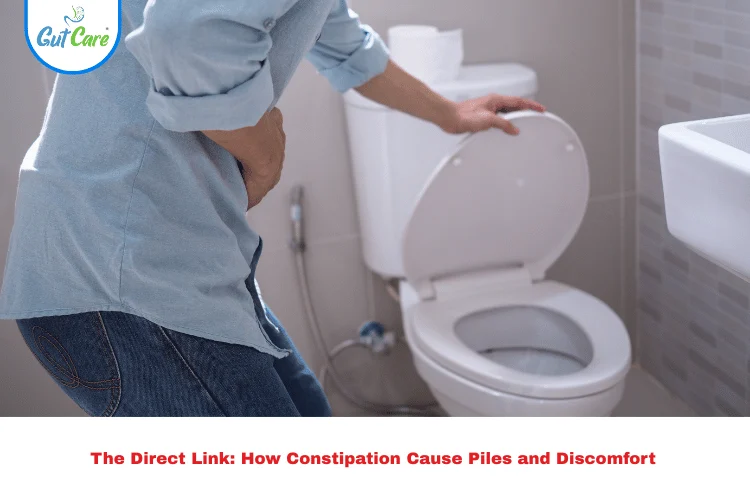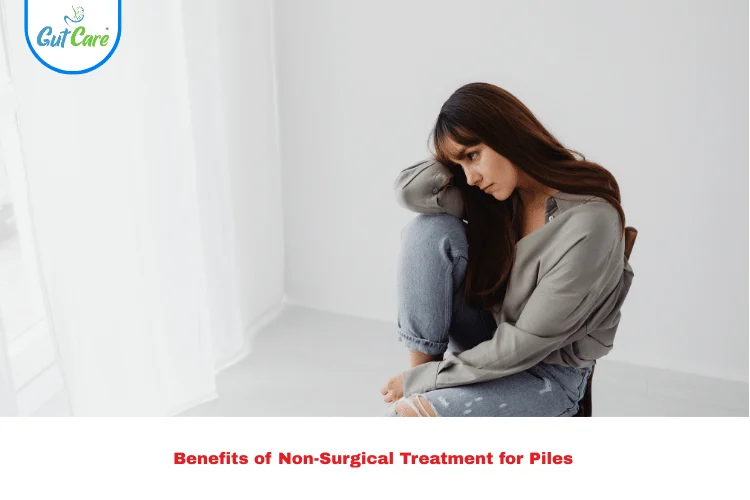Yes, hemorrhoids—or piles—can be a sign of poor gut health. Chronic constipation, inflammation, and an imbalanced gut microbiome are often linked to the development of piles. At GutCare Clinics in Bangalore, we help you understand the connection between piles and gut health, guiding you with expert care, diet, and lifestyle modifications to manage and prevent the condition effectively. Learn how your gut health influences hemorrhoids and what you can do about it.
Understanding Piles and Their Causes
Hemorrhoids, commonly known as piles, are swollen veins in the lower rectum and anus. They can cause discomfort, itching, pain, and bleeding, especially during bowel movements. While piles can occur for various reasons—such as pregnancy, aging, or prolonged sitting—gut health plays a significant role in their development.
The Piles and Gut Health Connection: Is It Real?
1. Unhealthy Gut Signs That May Trigger Piles
A poorly functioning digestive system can cause a range of problems:
- Chronic constipation
- Bloating and gas
- Straining during bowel movements
- Irritable bowel syndrome (IBS)
- Leaky gut syndrome
These unhealthy gut signs increase abdominal pressure and inflammation, worsening hemorrhoid symptoms or contributing to their onset.
2. Microbiome and Piles: Why Balance Matters
The gut microbiome is a complex community of beneficial bacteria that help with digestion, immune regulation, and inflammation control.
- An imbalance in gut bacteria (dysbiosis) can lead to digestive issues and poor stool quality, causing constipation or diarrhea—both of which irritate hemorrhoids.
- A healthy microbiome can reduce inflammation and support regular bowel movements, decreasing the risk of developing piles.
3. Leaky Gut and Piles: A Hidden Trigger
Leaky gut syndrome occurs when the intestinal barrier becomes compromised, allowing toxins and undigested food to enter the bloodstream. This can:
- Trigger systemic inflammation
- Weaken blood vessels in the rectum
- Lead to increased straining and piles development
If you suffer from leaky gut piles, you may also experience fatigue, food sensitivities, and skin issues.
Gut-Friendly Foods for Piles Prevention
Improving your diet is one of the easiest and most effective ways to prevent and manage piles. These gut-friendly foods promote digestion and reduce inflammation:
1. High-Fiber Foods
- Oats, barley, whole grains
- Leafy greens (spinach, kale)
- Fruits (apples, berries, pears)
- Legumes (lentils, beans)
Benefits: Fiber softens stool, prevents constipation, and reduces the need to strain.
2. Fermented Foods
- Yogurt, kefir, sauerkraut, kimchi
Benefits: Boost your gut microbiome, promoting smooth digestion and reducing inflammation that can irritate piles.
3. Hydration
- Drink at least 2-3 liters of water daily.
Benefits: Keeps stools soft and prevents constipation.
4. Omega-3 Fatty Acids
- Found in flaxseeds, walnuts, and fatty fish
Benefits: Anti-inflammatory properties that support gut and rectal health.
How to Improve Gut Health to Manage Piles
Improving gut health can reduce the occurrence and severity of piles. Here’s how:
1. Regular Exercise
- Stimulates bowel movements and reduces pressure on rectal veins.
2. Probiotics and Prebiotics
- Support gut flora with probiotic supplements and prebiotic-rich foods like bananas, onions, and garlic.
3. Avoid Processed Foods
- Cut down on fried and sugary items that disrupt the gut microbiome.
4. Stress Management
- Chronic stress affects digestion. Incorporate meditation, yoga, or deep breathing.
When to Consult a Piles Doctor
If you experience any of the following, consult a medical professional immediately:
- Persistent rectal bleeding
- Severe pain during bowel movements
- Blood in the stool
- Symptoms not improving with lifestyle changes
At GutCare Clinics in Bangalore, our gastroenterology experts specialize in treating conditions related to piles and gut health, offering personalized solutions for lasting relief.
Conclusion
Yes, hemorrhoids can be a sign of poor gut health. From the role of the microbiome to the impact of leaky gut and constipation, maintaining a healthy digestive system is crucial. Incorporating gut-friendly foods, staying hydrated, and seeking professional help when needed can make all the difference. If symptoms persist, don’t hesitate—book a consultation with GutCare Clinics in Bangalore to get back on track with your gut health.
Frequently Asked Questions (FAQs)
1. Can poor gut health lead to hemorrhoids?
Yes, piles and gut health are closely connected. Issues like constipation, leaky gut, and microbiome imbalance can increase the risk of hemorrhoids.
2. What are unhealthy gut signs that may relate to piles?
Signs include bloating, constipation, irregular bowel movements, and chronic inflammation—all of which can contribute to leaky gut piles and hemorrhoids.
3. How can I improve my gut to prevent piles?
Focus on a high-fiber diet, include fermented foods, drink plenty of water, and take probiotics. These gut-friendly foods for pile prevention support digestion and reduce inflammation.
4. Does gut microbiome affect piles?
Absolutely. An unbalanced microbiome and piles often go hand in hand. A healthy microbiome ensures smooth digestion, reducing strain during bowel movements.
5. Why is GutCare Clinics in Bangalore the best for piles and gut treatment?
GutCare Clinics offer expert gastroenterologists, advanced diagnostics, and holistic care focused on piles and gut health—making them a trusted choice in Bangalore.




